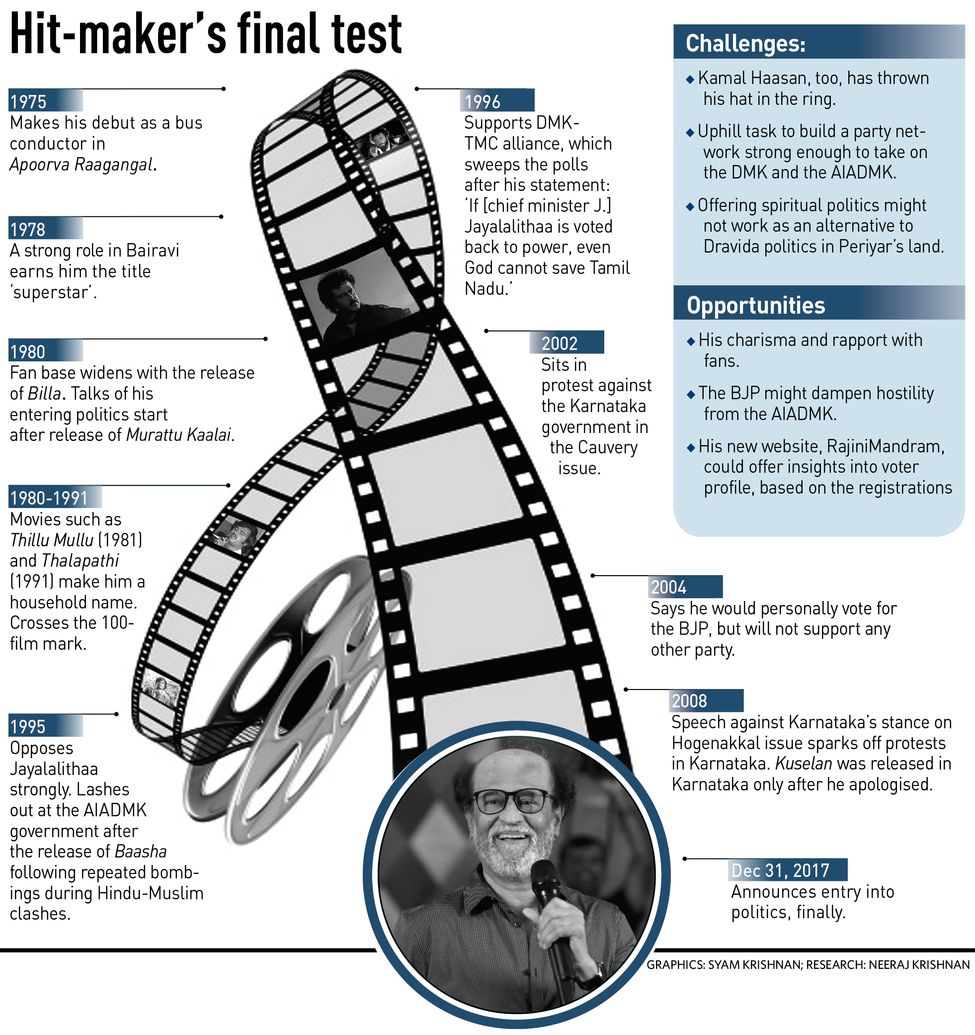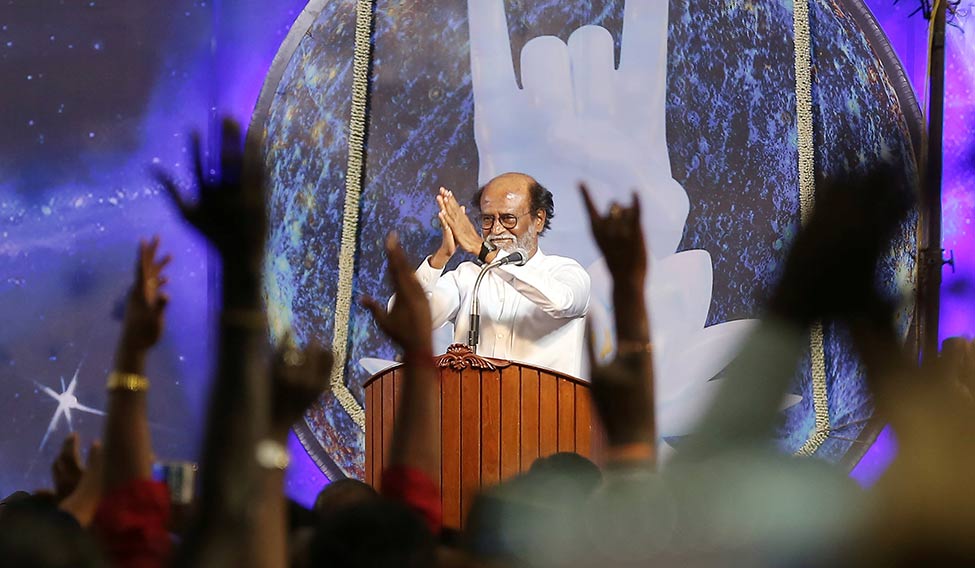After 22 years, the million-dollar question in Tamil Nadu politics has been answered. On December 31, Rajinikanth told fans gathered at the Raghavendra Mandapam in Chennai that he would launch a political party in time to contest all 234 seats in the next assembly polls, due in 2021. “Ithu kaalathin kattayam [It is the compulsion of time],” said the 67-year-old actor, quoting from the Gita on the importance of doing one’s duty and not worrying about the results. “If I don’t do this now, I would feel guilty till my death.”
Thunderous applause greeted the announcement. The fans had been waiting for him to take the plunge since 1995, when he scored two big successes with Baashha and Muthu and began testing the political waters. Supporting opposition parties in the run-up to the 1996 assembly polls, he had said, “If [chief minister J.] Jayalalithaa is voted back to power, even God cannot save Tamil Nadu.” Jayalalithaa wasn’t, and Rajinikanth’s statement is said to have played a role in that.
For two decades since, Rajinikanth blew hot and cold with his political plans. A few years ago, when talk of his impending political entry gained traction once again, he said, “It [politics] is deep. I cannot step in without knowing the depth.”
He has finally decided to step into the breach left by Jayalalithaa’s death in 2016 and DMK chief M. Karunanidhi’s absence in active politics. The big announcement came months after Rajinikanth told fans last April: “I have my profession, my job. You have your jobs to return to. Go back to your places and do your job. We will come back when it is time for the war.”
The war is near, apparently. “The events of the past few months have made every Tamilian hang their heads in shame,” he told fans in Chennai. “Politics has really become rotten, and democracy has been devalued.”
Rajinikanth has made it clear that he would not tread the beaten track of Dravida politics, the rationalistic and casteist overtones of which have dominated the state for decades. “There is a need for political change,” he said. “We need politics that is truthful, straightforward and clean. We need a kind of politics that is devoid of influences of caste and religion. We need spiritual politics. That is my goal and wish.”
He stopped short of explaining what spiritual politics was, but promised that he would spell out his ideology and policies in the coming months. For the time being, he has asked supporters to register at his new website, rajinimandram.org, with their names and voter identification numbers.
Sources close to Rajinikanth said his plans were measured, and that he would not take daring steps at any point of time. “This is why he announced that his party will contest all 234 assembly seats in the next polls,” said Tamilaruvi Manian, writer and former Congress leader, who has been helping Rajinikanth launch his party. “He will slowly build the party, and build consensus among his fans and the people. Only then would he get into electoral politics.”
Last August, Manian organised a meeting of Rajinikanth fans in Tiruchirappalli, where posters saying ‘Thalaiva, we are ready for war’ had appeared. The actor, however, took time to respond to the war cry. “Rajinikanth is a man who always does everything with finesse,” said Manian. “He doesn’t take decisions just like that.”
The Thalaiva is choosy when it comes to acting in films, and his political career may be no different. In recent years, when a few of his big projects—such as his daughter Saundarya’s directorial debut Kochadaiiyaan and director K.S. Ravikumar’s Lingaa—tanked at the box-office, he chose to work with Pa Ranjith, a lesser-known director then. Ranjith’s Kabali, which was released in 2016, was a critical and commercial hit. After having completed director Shankar’s much-hyped Robot 2.0, which will be released this April, Rajinikanth is again working with Ranjith, in a film that is expected to set the stage for the launch of his political party.
Rajinikanth by himself is a brand in films, and it seems his strategy is to extend that to politics as well. His popular appeal matches that of M.G. Ramachandran, who successfully crossed over from films to politics to become chief minister in the 1970s. But, in his initial years in politics, MGR had the support of Karunanidhi, a speech- and script-writer par excellence who also went on to become chief minister. Rajinikanth, however, would need to script his own political path.
But first, he needs to reveal his ideological position. “As I said, it is spiritual politics,” Rajinikanth told THE WEEK. “By spiritual politics, I mean politics by way of truthfulness and faithfulness.”
Asked how politics can be “truthful and faithful”, he said, “Please wait and see. I will bring in change.” In a brief interaction with select journalists in Chennai, he said he wanted to start a political revolution. “If there is a change in this generation, the future generations would live better,” he said.
But why ‘spiritual’ and not ‘secular’ politics? “Spiritual politics, as I said, is truthfulness and honest politics. It will not include religion, and it is not religious politics,” he said.
Rajinikanth’s intentions seem noble, but his string of platitudes delivered in halting Tamil are unlikely to bring about a political revolution. Even the charismatic MGR rose to power by building on the ideological foundation laid by articulate leaders like Periyar E.V. Ramasamy and C.N. Annadurai.
Not surprisingly, critics are already sneering at Rajinikanth’s plans. “This is a joke,” said BJP MP Subramanian Swamy. “One more film-star is entering politics, so what is this fuss about? Maybe he has got good media managers…. What will he do for Tamil Nadu? He has no details or documents. He is illiterate.”
Rajinikanth would do well to analyse what happened the last time a big Tamil star entered politics. Vijayakanth launched the Desiya Murpokku Dravida Kazhagam in 2005, promising an alternative to the established DMK and the AIADMK. In the first assembly elections the DMDK contested, in 2006, it polled 8 per cent. Over the subsequent years, Vijayakanth could not keep his promise as a credible alternative, and his party withered away.
Rajinikanth, too, may find starting from scratch very difficult, as most of his fans are middle-aged, and some of them are already part of existing political parties. Rajinimandram.org may have got 50,000 registrations—most of them youngsters—but that does not mean that the number will turn into votes.
By advocating change, Rajinikanth has portrayed himself as a messiah of sorts. And, by announcing that he will quit after three years if he cannot deliver on his promises, he has revealed that he sees himself more as a repository of people’s trust than as their representative. When he met his fans in Chennai on December 31, he never chose to hear them, but only spoke his views.
Unlike Kamal Haasan, the other big Tamil star who has also announced his plans to enter politics, Rajinikanth has never been known to state his opinions frankly. While Haasan has always been outspoken in matters that are of great public interest, Rajinikanth has never stood up for a cause, except in the early 2000s, when he supported Tamil Nadu in its dispute with Karnataka over sharing Cauvery waters.
Rajinikanth’s inhibition marks his political entry, too. “He says he will not contest local body polls, that he will only aim for the assembly elections and launch his party a few months before the general elections,” said political analyst R. Mani. “I feel this interregnum is to come into a settlement of sorts with a big political party.”
There is talk that Rajinikanth is likely to align with the BJP. The stage erected for the meeting in Chennai had a backdrop showing a mudra that was prominently featured in his 2002 film Baba. The backdrop showed the hand-signal resting on a white lotus, which is the BJP’s symbol. On January 3, however, he paid a surprise call on Karunanidhi, indicating that he is keeping his options open.
For the time being, Rajinikanth is banking on his anti-corruption stance and his demand for probity in politics. But it might not cut any ice with the common man. There have been allegations of financial mismanagement and nonpayment of salaries to teachers at a school run by Rajinikanth’s wife, Latha. In 2014, his daughter Soundarya was accused of cheating distributors while releasing Kochadaiiyaan, which she also produced. Ocher Studios, Soundarya’s animation company, was also accused of financial improprieties.
“Rajinikanth is a man who has been ruling the film industry for more than 25 years,” said blogger and political observer A. Shankar. “That being the case, his family members indulging in such irregularities would make his stance against corruption ring hollow. His speech during the fans’ meet [in Chennai] was just like his punch dialogues. He doesn’t have a roadmap.”















